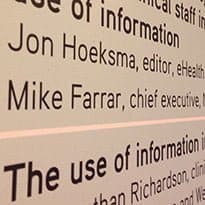The chief executive of the NHS Confederation has argued the health service must make better use of information if it is to survive.
He has also suggested that chief clinical information officers have a crucial role to play in bringing about such a change.
Mike Farrar was delivering the keynote presentation at the first CCIO Leaders Network Annual Conference, being run alongside EHI Live 2012 at Birmingham’s NEC.
His key message was that the lack of senior management interest in information is no longer viable.
“Unless we up our game around the management of information to inform the way our business works then we will not succeed. I put it as starkly as that,” he told delegates.
“For far, far too long the senior NHS community has been flying blind. I don’t think it’s tenable as we go forward to face challenges to not use information. Boards and chief executives need to understand that information is absolutely vital.”
He argued that, as clinicians with real frontline experience, CCIOs are in a particularly powerful position to encourage that transformation.
He said they could make their boards aware of the value of information in connecting with patients and bringing about clinical improvements.
“CCIOs are the white knights that deliver this and the quality of the messenger is important: clinicians are trusted more than politicians and managers.”
Farrar offered a variety of examples to illustrate his central message and gave particular insight into how clinical information – delivered by clinicians – can help drive service improvement.
He spoke of his experience when, as head of a strategic health authority, a local trust announced plans to reconfigure maternity and obstetrics services.
The plans drew public opposition but a consultant was able to use data to show that the change would save the lives of 30 babies a year.
“That one line became the absolute case on which we were able to talk to the public and the press,” Farrar said.
“A clinical led case for service change is so different to the way we have done it previously, with a management case made after the fact.”
He concluded with a clear statement of commitment to the widescale appointment of CCIOs in the health service.
“I’m a big believer in the survival of the NHS and I think people at this conference probably hold the most important key to it. That is why the NHS Confederation is backing CCIOs: because this is mission critical to the NHS going forward.”

